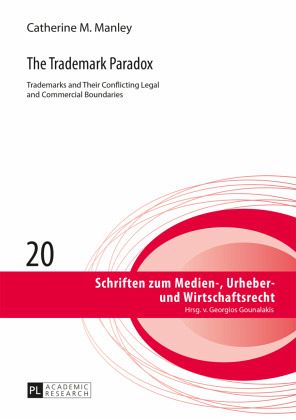
The Trademark Paradox
Trademarks and Their Conflicting Legal and Commercial Boundaries. Dissertationsschrift
Herausgegeben: Gounalakis, Georgios
Versandkostenfrei!
Versandfertig in 6-10 Tagen
120,40 €
inkl. MwSt.

PAYBACK Punkte
0 °P sammeln!
Trademarks play a fundamental role in our everyday lives as consumers, helping us to quickly choose the products we like and avoid those that we don't. Trademarks are also essential elements in a competitive market, allowing companies to build brand loyalty without fear of free-riding by competitors. Trademark laws thus diminish customer confusion, make "communication" between seller and buyer simple, and prevent unfairness. However, expanding legal protection, coupled with commercial "bullying", have served to restrict, rather than promote, competition. The paradox lies in how we have dealt w...
Trademarks play a fundamental role in our everyday lives as consumers, helping us to quickly choose the products we like and avoid those that we don't. Trademarks are also essential elements in a competitive market, allowing companies to build brand loyalty without fear of free-riding by competitors. Trademark laws thus diminish customer confusion, make "communication" between seller and buyer simple, and prevent unfairness. However, expanding legal protection, coupled with commercial "bullying", have served to restrict, rather than promote, competition. The paradox lies in how we have dealt with the conflict: in our quest to promote competition, we have failed to adequately balance private interests (e.g., protection of business goodwill) with public interests (ensuring a robust, competitive market without restraints on trade). This book examines trademarks' conflicting legal and commercial boundaries. It concludes by suggesting principles and guidelines to help resolve the imbalance.












